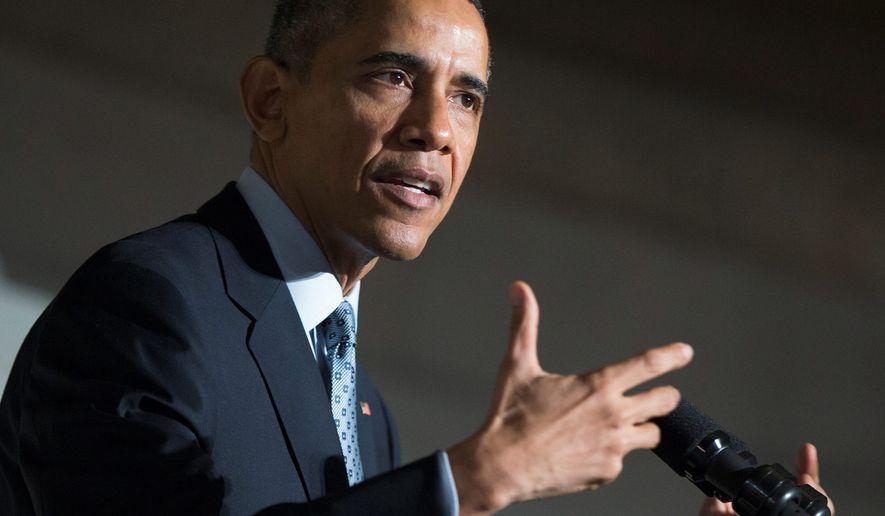Preparing for his annual two-week Hawaiian vacation, President Obama tried to reassure Americans Thursday that they’re safe from terrorist attack over the holidays.
After holding a meeting with top advisers at the National Counterterrorism Center in McLean, Virginia, Mr. Obama said the country must stay “united as one American family” to prevent further attacks like the one in San Bernardino, California.
“When Americans stand together, nothing can beat us,” Mr. Obama said.
The president didn’t mention the recent proposal by Republican presidential candidate Donald Trump to bar Muslim immigrants temporarily, but said the country “must remain true to our values.”
“We cannot give in to fear or change how we live our lives,” he said. “That’s what terrorists want. That’s what we have to guard against.”
Meanwhile, the U.N. Security Council unanimously adopted a resolution Thursday aimed at disrupting revenue that the Islamic State extremist group gets from oil and antiquities sales, ransom payments and other criminal activities.
The resolution, which was sponsored by the United States and Russia, elevates the Islamic State to the same level as al Qaeda, reflecting the growing threat of the militant group that Mr. Obama belittled last year as a “jayvee” team.
Treasury Secretary Jacob Lew, who chaired the meeting, called the Islamic State “a challenging financial target” because unlike other “terror groups” such as al Qaeda it gets a relatively small share of its funding from donors abroad.
The Islamic State group controls a large swath of Syria and Iraq, including oil and gas fields, though bombing campaigns by the U.S.-led coalition and ground forces have enabled Iraq to regain some territory.
Mr. Lew said it generates funds from economic activity and the resources in territory under its control and its financing “has evolved from seizing territory and looting bank vaults to leveraging more renewable revenue streams.”
So far, he said, “ISIL has reaped an estimated $500 million from black market oil and millions more from the people it brutalizes and extorts,” using an acronym for the extremist group.
At the same time, Mr. Lew said, ISIL has vulnerabilities because it needs large and sustained streams of income to pay fighters, procure weapons, and provide basic services for people living in areas it controls. He stressed that the Islamic State needs access to the international financial system for oil equipment, weapons, communications equipment and other imported items which requires them to move funds — and that provides opportunities for attack.
To cut off oil revenue, Mr. Lew said the U.S.-led coalition has been attacking ISIL’s entire oil supply chain from oil fields and refineries to destroying nearly 400 of its tanker trucks in the past month.
Emerging from the meeting at the counterterrorism center with Director of National Intelligence James Clapper, FBI Director James B. Comey, Homeland Security Secretary Jeh Johnson and others, Mr. Obama said the government doesn’t know of any “specific, credible” threat to the U.S. in the wake of the Islamic State-inspired attack in San Bernardino.
“I want every American to know — as you go about the holidays, as you travel and gather with family, and the kids open their presents, and as you ring in the New Year — that you’ve got dedicated patriots working around the clock all across the country to protect us all. I want every American to know as you go about the holidays,” he said.
Still, Mr. Obama said, “we have to be vigilant.”
“We are in a new phase of terrorism, including lone actors and small groups of terrorists, like those in San Bernardino,” he said. “Because they are smaller, often self-initiating, self-motivating, they’re harder to detect, and that makes it harder to prevent. But just as the threat evolves, so do we. We’re constantly adapting, constantly improving, upping our game, getting better.”
He said U.S. counterterrorism efforts are directed in three main areas: attacking terrorists in their base of operations in Syria and Iraq, preventing them from getting into the U.S., and disrupting potential attacks by radicalized people who are already in the U.S.
Part of the meeting at the counterterrorism center foxed on efforts to increase the level of trust between local law enforcement, faith leaders and high-tech companies, due to the extremists’ use of social media for recruiting.
⦁ This article is based in part on wire-service reports.
• Dave Boyer can be reached at dboyer@washingtontimes.com.




Please read our comment policy before commenting.